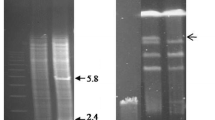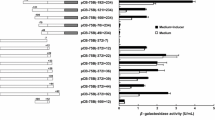Abstract
A sequence of 412bp, spanning the terminal half of thegrpE and the proximal portion of thednaK-homologues inBacillus subtilis, was amplified with PCR technology. This fragment was cloned into pJH101, anEscherichia coli plasmid, and transformed intoB. subtilis strain YB886. Several chloramphenicol-resistant colonies were obtained from this transformation. The integration of the plasmid into theB. subtilis chromosome was verified by restriction endonuclease analysis and Southern hybridization. Strain BUL101, a chloramphenicol-resistant transformant, lacked the DnaK-homologue as demonstrated by two-dimensional polyacrylamide gel electrophoresis and Western blot analysis. BUL101 grew at slower rates than parental cells at both 37°C and 48°C, produced abnormal cell shapes at 48°C, and was unable to grow at 51°C. The 412bp fragment did not exhibit detectable promoter activity.
Similar content being viewed by others
Literature Cited
Arnosti DN, Singer VL, Chamberlin MJ (1986) Characterization of heat shock inBacillus subtilis. J Bacteriol 168:1243–1249
Boylan RJ, Mendelson NH, Brooks D, Young FE (1972) Regulation of the bacterial cell wall: analysis of a mutant ofBacillus subtilis defective in biosynthesis of teichoic acid. J Bacteriol 110:281–290
Bukau B, Walker GC (1989a) Cellular defects caused by deletion of theEscherichia coli dnaK gene indicate roles for heat shock proteins in normal metabolism. J Bacteriol 171:2337–2346
Bukau B, Walker GC (1989b)dnaK52 mutants ofEscherichia coli have defects in chromosome segregation and plasmid maintenance at normal growth temperatures. J Bacteriol 171:6030–6038
Cohen SN, Chang ACY, Hsu L (1972) Nonchromosomal antibiotic resistance in bacteria: genetic transformation ofEscherichia coli by R-factor DNA. Proc Natl Acad Sci USA 69:2110–2114
Ferrari FA, Ferrari E, Hoch JA (1982) Chromosomal location of aBacillus subtilis DNA fragment uniquely transcribed by sigma 28-containing RNA polymerase. J Bacteriol 152:780–785
Ferrari FA, Ngyuen A, Lang D, Hoch JA (1983) Construction and properties of an integrable plasmid forBacillus subtilis. J Bacteriol 154:1513–1515
Friedman DI, Olson ER, Georgopoulos C, Tilly K, Herskowitz I, Banuett F (1984) Interactions of bacteriophage and host macromolecules in the growth of bacteriophage lambda. Microbiol Rev 48:299–325
Hearne CM, Ellar DJ (1989) Nucleotide sequence of aBacillus subtilis gene homologous to thednaK gene ofEscherichia coli. Nucleic Acids Res 17:8373
Miller BS, Kennedy TE, Streips UN (1991) Molecular characterization of specific heat shock proteins inBacillus subtilis. Current Microbiol 22:231–236
Mongkolouk S, Chang Y, Reynolds RB, Lovett PS (1983) Restriction fragments that exert promoter activity during postexponential growth ofBacillus subtilis. J Bacteriol 155:1399–1406
Neidhardt FC, VanBogelen RA (1987) Heat shock response. In: Neidhardt FC (ed)Escherichia coli andSalmonella typhimurium: cellular and molecular biology. Washington D.C.: American Society for Microbiology Press, pp 1334–1345
Neidhardt FC, VanBogelen RA, Vaughn V (1984) The genetics and regulation of heat shock proteins. Annu Rev Genet 18:295–329
O'Farrell (1975) High resolution two dimensional electrophoresis of proteins. J Biol Chem 250:4007–4021
Paek K, Walker GC (1987)Escherichia coli dnaK null mutants are inviable at high temperature. J Bacteriol 169:283–290
Richter A, Hecker M (1986) Heat-shock proteins inBacillus subtilis: a two dimensional gel electrophoresis study. FEMS Microbiol Lett 36:69–71
Saiki RK, Gelfand DH, Stoffel S, Horn GT, Mullis KB, Erlich HA (1988) Primer-directed enzymatic amplification of DNA with thermostable DNA polymerase. Science 239:487–491
Sakakibara Y (1988) ThednaK gene ofEscherichia coli functions in initiation of chromosome replication. J Bacteriol 170:972–979
Southern E (1975) Detection of specific sequences among DNA fragments separated by gel electrophoresis. J Mol Biol 98:503–527
Spizizen J (1958) Transformation of biochemically deficient strains ofBacillus subtilis by deoxyribonucleate. Proc Natl Acad Sci USA 44:1072–1078
Streips UN, Polio F (1985) Heat shock proteins in bacilli. J Bacteriol 162:434–437
Todd JA, Hubbard TJP, Travers AA, Ellar DJ (1985) Heat shock proteins during growth and sporulation ofBacillus subtilis. FEBS Lett 188:209–214.
Wachlin G, Hecker M (1984) Proteinbiosynthesen nach Hitzeschock inBacillus subtilis. Z Allgem Mikrobiol 24:397–401
Wetzstein M, Schumann W (1990) Nucleotide sequence of aBacillus subtilis gene homologous to thegrpE gene ofE. coli located immediately upstream of thednaK gene. Nucleic Acids Res 18:1289
Wetzstein M, Dedio J, Schumann W (1990) Complete nucleotide sequence of theBacillus subtilis dnaK gene. Nucleic Acids Res 18:2172
Zylicz M, Ang D, Liberek K, Georgopoulos C (1989) Initiation of lambda DNA replication with the purified host- and bacteriophage-encoded proteins: the role of the DnaK, DnaJ, and GrpE heat shock proteins. EMBO J 8:1601–1608
Author information
Authors and Affiliations
Rights and permissions
About this article
Cite this article
Staples, R.R., Miller, B.S., Hoover, M.L. et al. Initial studies on aBacillus subtilis mutant lacking the dnaK-homologue protein. Current Microbiology 24, 143–149 (1992). https://doi.org/10.1007/BF01568979
Issue Date:
DOI: https://doi.org/10.1007/BF01568979




